UIC Applied Health Sciences
MAGAZINE



New program trains undergraduate students to address health disparities and build careers.

Carol Gill and Larry Voss are remembered for advancing disability rights, scholarship and pride
The BUILT program promotes sustainable routines around food, sleep and movement
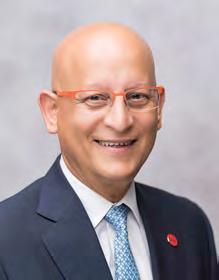
Although the AHS community needs no reminder, we have entered a period of great uncertainty in America. Feeling unease is only natural as the promise of scientifc discovery is neglected, as misinformation challenges public health and as the merits of diversity, equity and inclusion are called into question. These rapid changes are disorienting, and it would be easy to lose our way. But here in AHS, our colleagues show us how to stay the course. This issue features plenty of examples of students and faculty living out our college’s mission despite the roadblocks — moving forward with our goal of providing the broadest access to educational, clinical and research excellence.
In the BUILT program, Eduardo Bustamante leads AHS students and faculty into communities to help kids and their parents create healthy habits at home. Meeting families where they are, BUILT uses current research to develop fun lessons that make a real impact on nutrition, movement, sleep and screen time.
EXITO fellows are preparing to build their own careers as researchers. In this new program, students participate in three years of special study and hands-on research training, so they can build careers serving the communities that need it most. At the core of the program is the knowledge that given a fair shot and some support, these students don’t just succeed in research or advanced education — they become the best equipped innovators, perfectly positioned to improve health outcomes in spaces they uniquely understand.
Whi le we plant seeds for future research, it’s also important to refect on the legacy of those whose work informs our own. This issue includes a remembrance of Carol Gill and Larry Voss, key contributors in DHD and in the international movement for disability rights, scholarship and pride. This couple exemplifed what it means to insist on equity and progress, even when the world stands in your way. Let us remember their struggles and successes as we face the challenges that lie ahead.
Students, alumni, faculty and staf — all of us within AHS have a reliable map to follow even when the path before us looks difcult. I am inspired by the stories in this issue and the achievements of our colleagues, and I am confdent in our community’s ability to continue forward to create a world where every person can live a healthy and self-determined life.

Carlos J. Crespo Dean and professor College of Applied Health Sciences
UIC Applied Health Sciences Magazine
Winter 2025
EDITOR
Erika Chávez
Director of marketing and communications
DESIGN
Heidi Schlehlein
Webmaster and graphic designer
CONTRIBUTING WRITERS
Antonie Boessenkool, Sonya Booth, Brian Flood, Rob Mitchum, Emily Parenti-Lopez, Francesca Sacco and UIC News contributors
CONTRIBUTING PHOTOGRAPHERS
UIC Creative and Digital Services, UIC
Ofce of Strategic Marketing and Communications
©2025 University of Illinois Chicago. All rights reserved. Published by the Ofce of the Dean, UIC College of Applied Health Sciences, 808 S. Wood St., 169 CMET, Chicago, IL 60612-7305.
Views expressed in this publication do not necessarily refect the opinions of the editor, the college or university.
Telephone (312) 996-6695
Fax (312) 413-0086
E-mail eachavez@uic.edu
Website ahs.uic.edu
You might notice abbreviations throughout this issue. They correlate to academic units and programs in the College of Applied Health Sciences.
AT Athletic Training
BHI Biomedical and Health Informatics
BHIS Department of Biomedical and Health Information Sciences
BVIS Biomedical Visualization
DHD Department of Disability and Human Development
DIS Disability Studies
EP Exercise Physiology
HI Health Informatics
HIM Health Information Management
KINES Kinesiology
KN Department of Kinesiology and Nutrition
MLS Medical Laboratory Sciences
NUT Nutrition
OT Department of Occupational Therapy
PT Department of Physical Therapy
RS Rehabilitation Sciences
Carol Gill and Larry Voss are remembered for advancing

Igniting success
New program trains undergraduate students to address health disparities and build careers
Family health from the ground up
The BUILT program promotes sustainable routines around food, sleep and movement New

David Marquez named Department of Kinesiology and Nutrition head


Entry-level doctor of occupational therapy earns accreditation

A new master’s degree program in disability access and inclusion has received applications for its frst cohort of students and is set to begin classes in fall 2025.
Formerly known as the MS in disability and human development, the revamped program flls a gap in disability education, providing instruction beyond compliance with bureaucratic bare minimums. It also refocuses existing coursework for students pursuing a professional track, rather than PhD or research careers.
Te program ofers a “comprehensive, applied and practical approach” to disability access and inclusion, said Robert Gould, DHD clinical associate professor and co-director of the new program with Sarah Parker Harris, DHD professor and associate head.
“Tere’s a lot of one-of trainings out there that will give you the requirements, but we encourage more critical thinking in practice and look at the nuances in working professionals’ experiences.”
Te hybrid program requires 32 credit hours, which can be completed in person or online in three to four semesters. During their frst semester, students choose between two concentrations: disability accessibility or assistive technology. A critical component in both concentrations is feldwork.
Students will gain hands-on experience within the vibrant disability community at UIC and around the city. Collaborating
organizations include the Great Lakes ADA Center, Bodies of Work, the Disability Culture Center, the Assistive Technology Unit and the Developmental Disabilities Family Clinic.
Comparable master’s programs at universities around the country are geared toward specifc industries, ofering vocational rehabilitation degrees to special education teachers or social workers, for example. Students in UIC’s program, however, are prepared for careers across a spectrum of disability access work: as ADA coordinators at the organizational or city level, as experts in disability resource centers or as facilitators within cultural or educational institutions.
Te program’s assistive technology concentration is one of three degree programs in the U.S. that ofer accreditation through the Rehabilitation Engineering and Assistive Technology Society of North America. But the degree, with either concentration, is designed to transcend legal requirements and compliance training. Students will be prepared to coordinate services and apply adaptive technologies, but they can also study disability culture and representation, civil rights or organizational change.
Te coursework addresses “the spirit of the law,” said Parker Harris. “Tere is an increased demand to move beyond compliance and to actually embrace inclusion in ways that are applied and practical. Learning how to ‘do inclusion’ — from documents to people and everything in between — is critically important across multiple industries.”
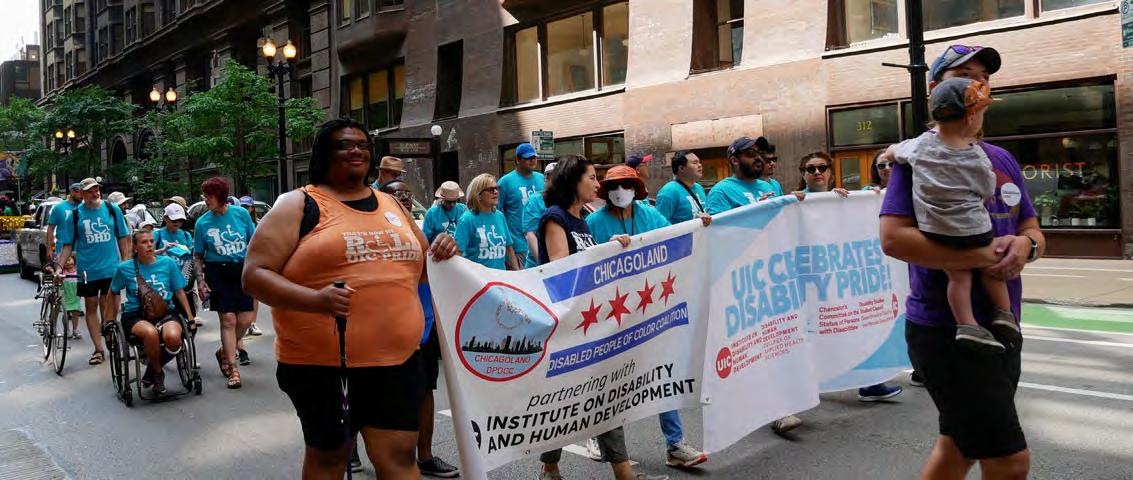
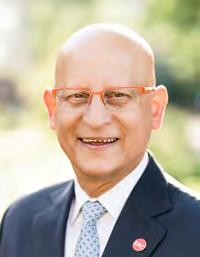
Carlos Crespo, AHS dean and KN professor, has been awarded a fellowship as part of the Hispanic Association of Colleges and Universities' sixth cohort of its Leadership Academy/La Academia de Liderazgo.
Founded in 1986, the association represents more than 500 institutions committed to higher education success for Hispanic students in the U.S., Latin America and Spain.
“Te HACU Leadership Academy/La Academia de Liderazgo has a proven record of advancing diverse leaders within a wide range of higher education institutions,” said HACU President and CEO Antonio R. Flores. “We fully expect this cohort to
match if not exceed our alums in successfully breaking into leadership roles across the nation.”
Troughout the 2024-2025 fellowship, participants will develop organizational leadership skills and strategies for applying those skills at institutions serving large Latine/x populations. Current and former university presidents, chancellors and senior administrators will instruct the fellows; one-on-one mentorship is a key component of the program. Each fellow will also develop a special project that positively impacts their institution.
Te 2024-2025 fellowship includes in-person and virtual seminars, the frst of which were held in October 2024 at HACU’s 38th annual conference in Aurora, Colorado. A second seminar will be held in Washington, D.C. in April 2025 at HACU’s National Capitol Forum.

In October 2024, the Department of Physical Terapy hosted approximately 75 students, alumni, faculty and staf in AHSB for networking and refreshments, a lecture and a Q&A.
Alumni from across PT’s long history were in attendance, ofering current students a chance to learn from and connect with the department’s past. Te frst cohort of PT graduates earned their degrees in 1973, making the department more than 50 years old.
“We hope to make this a tradition,” said PT clinical assistant professor Richard Severin ’22 PhD RS, “and will try to place it closer to orientation to connect the newest cohort of students with the department’s illustrious history.”
Te event’s keynote speaker was PT professor emerita and former department head Suzann K. Campbell, whose research and publications on pediatric physical therapy have become standard resources for physical therapy programs across North America. Her lecture and the subsequent Q&A focused on the delay in applying transformative research in clinical settings.
“Te alumni and students were very appreciative of the chance to afliate with Dr. Campbell, who’s been an integral part of the department and practice,” said PT professor Tanvi Bhatt.
Afer this inaugural event’s success, the department hopes to expand the oferings to include round tables or other informal conversation opportunities, keeping participants’ interests piqued with discussions on hot topics in the feld of PT.
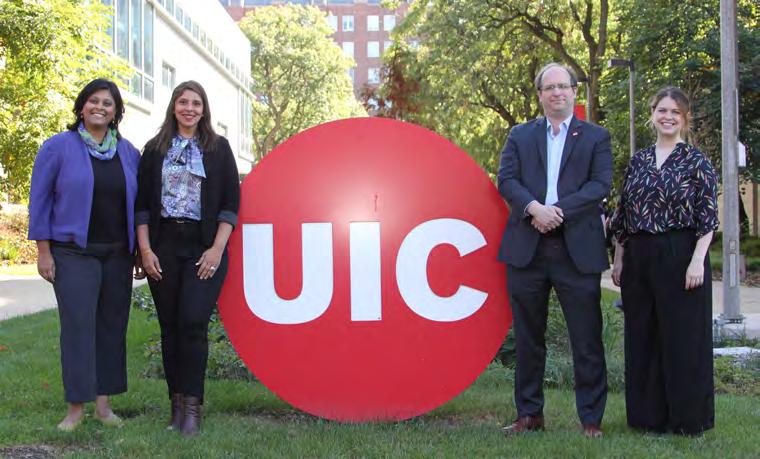
Health care is more than doctor visits; it’s a team efort. But most artifcial intelligence-driven technologies built on patient data use only the information provided by physicians, omitting crucial input from nurses and rehabilitation therapists.
An innovative, interdisciplinary project co-led by the University of Illinois Chicago will use AI to unify data from a broader range of health professionals and create holistic datasets that could transform health care.
Te collaboration between UIC, University of Iowa, University of Missouri, Loyola University and technical partners Microsof and Tackle AI received $10 million from the federal Advanced Research Projects Agency for Health, or ARPA-H. Te award is the frst ARPA-H funding received by UIC, which will serve as the contracting institution.
Researchers will create new ways to combine structured data and free-text notes from nurses, physical and occupational therapists, speech and language pathologists and physicians for more efective use in electronic health records. Te project will focus on two complex populations: patients who have experienced fall-related injuries and infants transitioning from the neonatal intensive care unit to home.
“Health care is an interdisciplinary process, but existing data tools and infrastructure ignore most of the team,” said Andrew Boyd, one of the project’s principal investigators and professor of BHIS, RS and PT. “Other professions see patients more frequently and provide very high-fdelity data that gets closer to the reality of the patient, instead of just the brief snapshots in time that you get from data documented by physicians.”
Much of AI’s promise for health care is its potential to automatically extract insights from electronic health records. More data within a patient record can therefore lead to better AI guidance. Research has shown that including observations from nurses in patient data can lead to more accurate predictions on measures such as the risk of dying in a hospital than physician notes and lab results alone.
Te value of multidisciplinary data is clear in cases such as fall injuries, which patients may not report accurately. Narrative notes from emergency-room attendants or outpatient therapists are crucial for determining future injury risk, but they are difcult to combine with numerical data.
“Data is gold, but until it can be used, it is meaningless,” said Tanvi Bhatt, co-investigator on the project and PT professor. “If that text is lost, there is no continuum of care.”
Incorporating this data will also help involve the patient in health care decisions, said Mary Khetani, another co-investigator and OT and RS professor. Te notes taken by physical and occupational therapists ofen come directly from interviews with a patient and their family. Organizing the data to share with patients and their caregivers can help them feel more informed as they navigate multiple health care services outside of the hospital.
Computer scientists from UIC, in partnership with the project’s health science experts, will develop advanced text-mining and language-processing tools to overcome the technical hurdles that prevent data integration. Trough hackathons and other activities using deidentifed data, the team will also invite data scientists and sofware developers to create additional clinical and research applications. All tools developed by the project will be open source and built with input from health-domain experts.
Te partnership highlights the strengths of UIC: seven health sciences colleges representing a broad range of disciplines and a computer science department with deep research expertise in machine learning, natural language processing and data science.
Other UIC team members on the project include clinical assistant professor in BHIS and PT Sam Bond ’16 MS BVIS, clinical professor of biomedical engineering Miiri Kotche and associate professor of clinical emergency medicine David Chestek.
For the third consecutive year, KINES and NUT students were at the fnish line of the Chicago Marathon — not as runners but as volunteers in an efort organized by the Department of Kinesiology and Nutrition.
As thousands of runners fnished the 26 mile race, 51 kinesiolo gy and nutrition students were there to help those who needed a hand or substantial medical help.
“Our program has grown each year,” said Meredith Wekesser, KN clinical assistant professor. “Te student volunteers were helping out in so many diferent capacities throughout the entire marathon weekend.”
For undergraduate KINES students, volunteering for the Oct. 13 marathon was part of a special projects course. Graduate students came from the performance sport and exercise psychology graduate program.
Before race day, the students pitched in at the pre marathon expo held at McCormick Place Convention Center. As part of the Chicago PSYCHing team, they gave runners encouragement and talked through their concerns ahead of the race.
On the day of the marathon, the student volunteers arrived before dawn, ready with ice packs and continued encourage ment. Most of the volunteers stood among the runners as they
crossed the fnish line so they could spot those in need of help and jump into action.
“We congratulated the runners and conducted quick assess ments of their mental status and well being,” Wekesser said. “If they needed assistance from a psychological standpoint or medical standpoint, we were basically the frst responders in that scenario who would get them to the next level of care.”
Some runners needed assistance moving out of the way as waves of more runners approached the fnish line. Others needed more immediate care.
“We might see a runner go down afer fnishing the race. We would run over to them and assess them,” Wekesser said. “One runner was laying on the ground on his back and his legs were cramping everywhere. So we were there trying to help him breathe through it and give him some tips, so he could get through those cramps. Ten we helped him walk out of the fnish line area.”
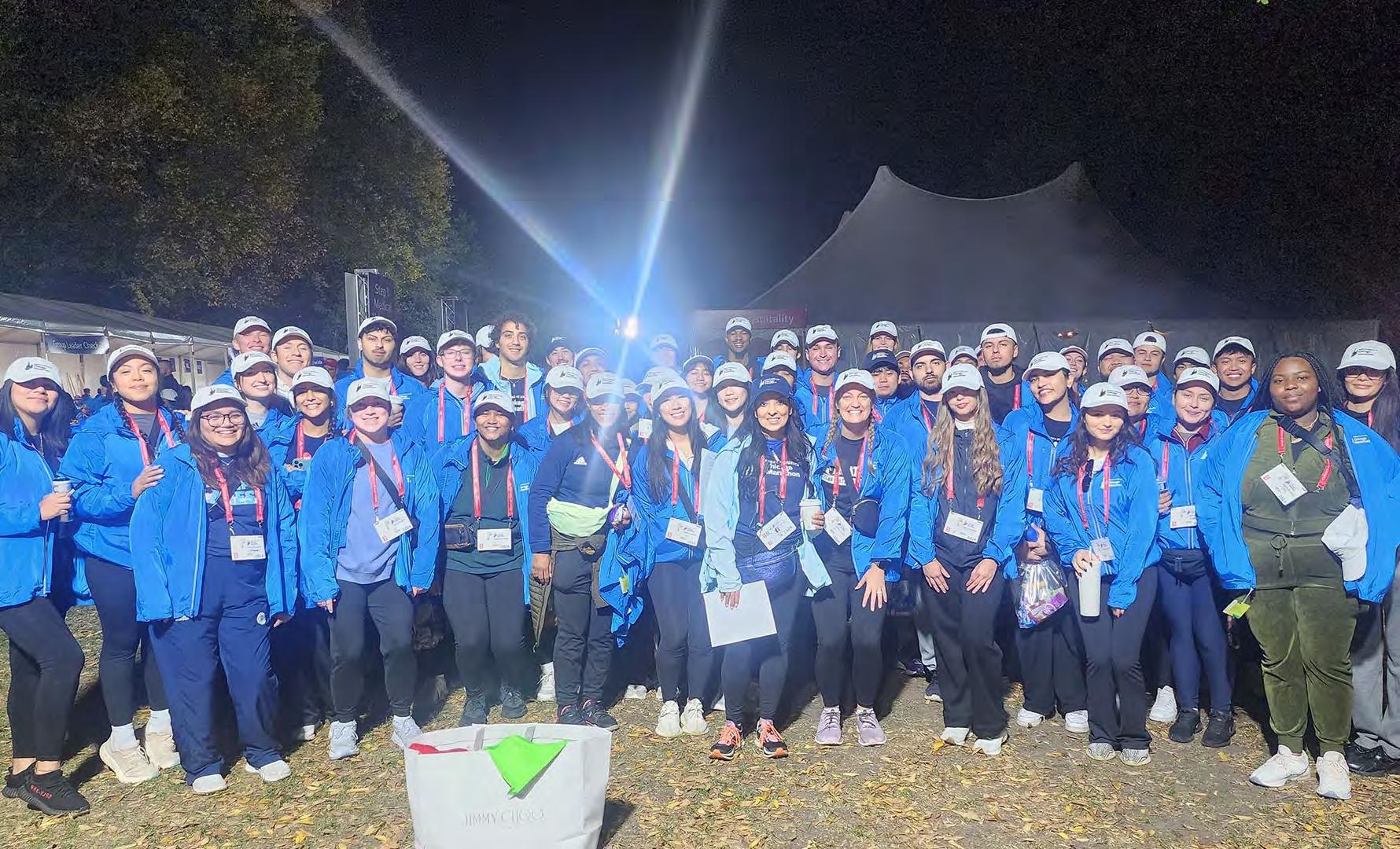
For students, it’s invaluable hands on experience, she said.
“It was a lot of on the spot, quick thinking,” Wekesser said. “It’s a high pressure environment, but it’s an opportunity for them to use those critical thinking skills and apply what they’ve learned in the classroom to this experiential opportunity.”
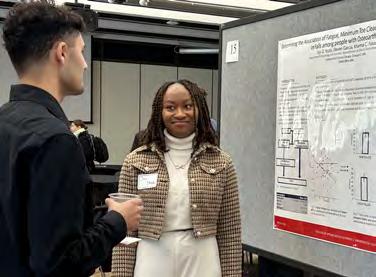
AHS Research Day — an annual event for AHS students, faculty and staf to share their work and collaborate across disciplines — took place Nov. 20 with an expanded schedule of oferings for 2024.
Previous iterations of AHS Research Day were focused on graduate student poster presentations, but for this year’s gathering, associate dean of research Kharma Foucher added new programming to encourage more participation.
“One of my goals as associate dean of research has been to provide more opportunities for fnding connection and community across our silos,” Foucher said. “So when we were forced to hold the event earlier in the day due to constraints of the venue, I took it as an opportunity to experiment with a new format.”
Te reimagined event included presentation opportunities to undergrads, small group mentorship discussions and a visiting lecturer.
Approximately 50 posters were displayed from graduate, undergraduate, faculty and postdoc presenters representing all AHS departments. Presenters could select a focus area from a list of options, such as health disparities, aging, nutrition or disability. Afer the poster session, attendees broke into small groups for lunch and mentorship with AHS faculty.
Foucher was inspired by a meeting she attended last summer where she served as a “table mentor” and adapted the format for AHS. Physical therapy professor Tanvi Bhatt assisted, adding to the list of discussion topics and inviting faculty mentors.
A guest lecture followed, given by Lise Worthen-Chaudhari, assistant professor in Te Ohio State University College of Medicine’s department of physical medicine and rehabilitation research. She presented on biomechanics, dance and music as tools for breast cancer survivors.
“It was gratifying to hear conversations among people that may not normally interact,” Foucher said. “I know of at least one new research collaboration that emerged!”

A recent study in Disability and Rehabilitation investigates fear of falling and fall-related injuries among wheelchair and motorized scooter users. Te research was conducted by OT clinical professor Elizabeth Peterson, along with University of Illinois Urbana-Champaign professor Laura Rice and graduate student Sahel Moein.
Tough plenty of research focuses on falls among ambulatory people with conditions like multiple sclerosis or Parkinson’s disease, studies to address incidents among those who rely on mobility devices are rare.
Te research team reexamined a survey of 156 full-time wheelchair or scooter users. Ninety-six percent of the participants reported having fallen at least once in the previous 12 months. Of those, 74% had sufered a fall-related injury, and 94.6% were afraid of falling again. Tose who experienced fall-related injuries reported higher levels of anxiety and less frequent use of their mobility devices than their peers.
“We were not especially surprised, because walking short distances is essential to daily function for many wheelchair and scooter users,” Peterson said.
Te fndings point to several needed interventions. Because a history of falling is associated with a higher risk of future falls, health care providers should gauge an individual’s chances of falling and ofer safety training. Te team is testing a program they designed for occupational or physical therapists to help wheelchair users address potential risks.
“Participants engage in exercise, practice transfer and other wheelchair skills and create plans to manage falls when they happen,” Peterson said.
Te researchers hope to raise awareness of fall risk among caregivers for this population.
“Health care providers sometimes think that giving someone a wheelchair will solve their problem,” said Rice. “But people need to be trained to use the equipment and cope with the challenges that come with these devices.”

Afer a national search for head of the Department of Kinesiology and Nutrition, AHS dean Carlos Crespo recommended David Marquez, KN professor, director of the Exercise Psychology Laboratory and interim KN department head since 2023. Te appointment was efective Sept. 19.
“Dr. Marquez was the top candidate because of his national reputation, research accomplishments, academic excellence and, above all, an unwavering commitment to advance the interest of the department,” said Crespo. “He is highly committed to taking KN to the next level, and he understands the important role the department plays at UIC.”
“One of my goals as department head is to ensure that the university, city and nation know about the phenomenal research, teaching, service and clinical practice that come from our department,” said Marquez. “We have the top-ranked PhD program in the state, and the BS and MS in nutrition programs boast a 100% graduation rate. People should know about this excellence.”
Marquez began with AHS in 2007 as an assistant professor in KN, moving up to associate and then to professor by 2019. He is also a visiting associate professor at Rush Alzheimer’s Disease Center. He was named AHS Professor of the Year in 2022 and AHS Humanitarian of the Year in 2019.
Marquez’s research examines disparities in physical activity and disease/disability among communities with diferent levels of
social advantage. His studies focus particularly on older Latino adults, who experience unique obstacles to healthy forms of physical activity — cultural biases, stresses of immigration, poverty, intergenerational caregiving, racism, neighborhood violence or chronic health conditions. For his dedication to improving health outcomes for this community, the Chancellor’s Committee on the Status of Latinos selected Marquez as the faculty recognition award recipient for the 2023-2024 term. Marquez also received an honorable mention in the 2024 UIC Faculty Diversity, Equity and Inclusion Awards.
“Te KN department and UIC as a whole are urban and minority-serving,” said Marquez, “with many frst-generation college students and commuters. Tis complexity also brings much diversity, which is a strength we can lean on.”
Marquez has received numerous honors and awards for his work, including fellow status within the Gerontological Society of America, Society of Behavioral Medicine and American College of Sports Medicine. He is a standing member of the National Institutes of Health’s Biobehavioral Medicine and Health Outcomes Study Section and the Centers for Disease Control and Prevention’s Healthy Brain Initiative Road Map Leadership Committee. He also served on the national committee that advised the U.S. Department of Health and Human Services’ recent update to the Physical Activity Guidelines for Americans.
“I am extremely privileged to now have the opportunity to lead the Department of Kinesiology and Nutrition,” said Marquez.
“Te students, staf and faculty are unmatched.”
As part of UIC’s top ranking online bachelor’s degree oferings, AHS’ BS in health information management has been recognized among the nation’s best.
On U.S. News & World Report’s 2025 list of best online programs, UIC’s bachelor’s programs tied for third overall. Tis marks the 13th consecutive year U.S. News included UIC in its top ranks.
More than 1,600 online degree programs were evaluated using metrics specifc to online learning. UIC's recognition includes the BSHIM program along with two other undergraduate degree-completion programs: the College of Nursing’s RN to
Bachelor of Science in Nursing and the College of Business Administration’s Bachelor of Business Administration.
Te 100% online BSHIM program provides skilled instruction in using information for health care planning and provision, resource allocation and executive decision-making. It is designed to prepare graduates to take the prestigious Registered Health Information Administrator exam. Students explore topics such as coding, systems analysis, data quality management and health information research.
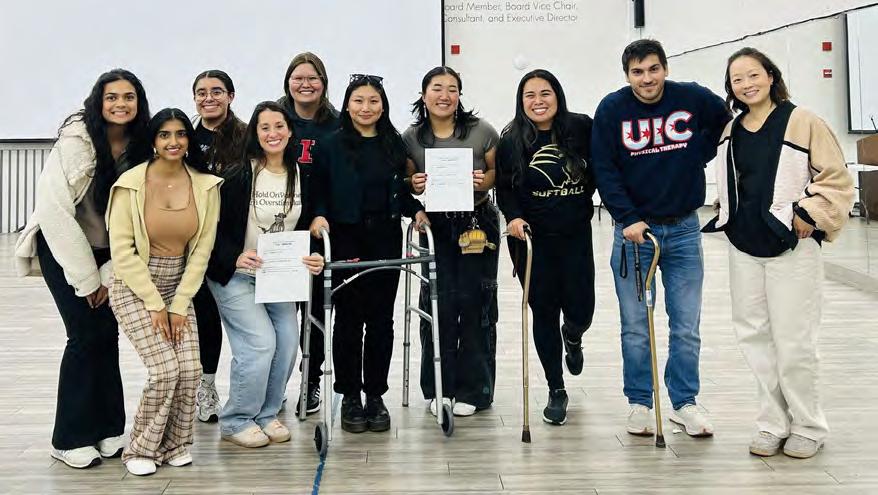
requirements by watching safety demonstrations and participating in practice stations supervised by Lee and the student volunteers.
In addition to facilitating the hands-on training, students also received valuable experience working with diverse populations.
“Most of the caregivers at this event did not speak English,” Lee said, “so it gave students the opportunity to practice using alternative communication strategies, providing feedback and collaborating with translators, which are valuable skills in a real-world setting.”
Clinical associate professor in OT Jenica Lee, together with more than 30 occupational therapy and physical therapy students, taught home health care aides body mechanics and safe transferring practices in partnership with the Chinese American Service League.
Over the course of four evenings in October, approximately 450 home care aides fulflled Illinois Department of Aging training
Body mechanics and transfer trainings were held yearly at the Chinese American Service League until the COVID-19 outbreak in 2020. Tis year’s workshop was the frst time Lee has been back to lead in-person training since before the pandemic.
“It was great to see how engaged the caregivers were in relearning these essential skills,” Lee said.
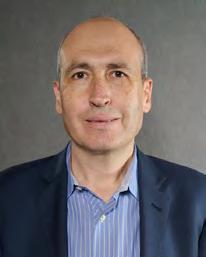
Jacob Krive
Jacob Krive, BHIS clinical associate professor, is one of 87 new fellows to be inducted into the American Medical Informatics Association (AMIA). Te 2025 class will join 579 current AMIA fellows in a formal induction ceremony at the AMIA 2025 Clinical Informatics Conference in Anaheim, California May 20-22, 2025.
“Dr. Krive has been instrumental and accomplished this through his research, teaching, service and faculty practice work. He absolutely deserves this recognition and I’m proud of his accomplishment," said Kal Pasupathy, head of BHIS.
Krive’s research interests include clinical decision support systems, cloud computing for medical research, patient data management, artifcial intelligence and the economics of health informatics. He has designed several courses for BHIS graduate programs, co-designed an elective AI course for College of Medicine students and founded a cardio-oncology AI research lab.
“I am honored to receive this AMIA fellowship award,” Krive said, “which recognizes deep expertise in medical informatics, but more importantly my decades of service to the feld from multiple angles — professional in the health care provider space, scholarly via research contributions and teaching by leading hundreds of students in becoming new generations of talented analysts and informaticists. I am also appreciative of the UIC campus, AHS college leadership and my BHIS department for being my academic home for the past 12 years and encouraging me to think, innovate and share my knowledge.”
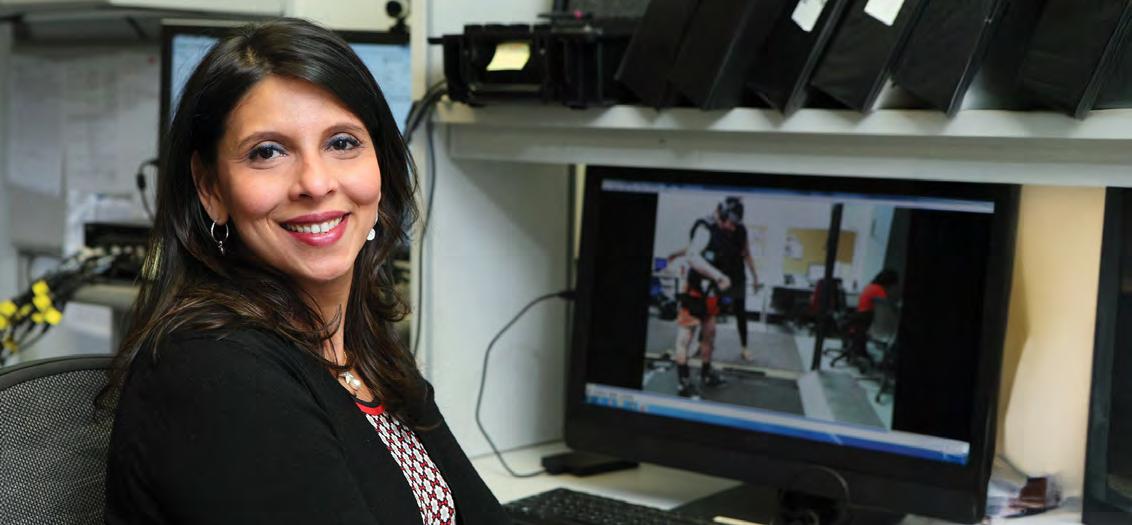
Tanvi Bhatt, PT professor and director of the Cognitive Motor Balance Rehabilitation Lab, was recently awarded two major grants, exceeding $1.5 million and $3 million, from the U.S. Department of Defense and the National Institute on Aging. Te grants will facilitate research on functional balance intervention and fall prevention.
Bhatt’s frst grant, awarded by the U.S. Department of Defense in the amount of $1,599,997, will support a three-year study on functional balance interventions for people with multiple sclerosis, a condition that afects approximately 1 million adults in the U.S. Of those afected, more than 80% have physical impairments, including muscle weakness, spasticity and balance issues, Bhatt explained. Up to 60% experience cognitive impairment, such as slowed thinking, poor problem-solving or memory difculties, and up to 30% will develop severe dementia.
“Tere are numerous studies researching treatments to improve physical function,” Bhatt said, “but treatments targeting cognitive function are still in early stages.”
Bhatt’s study will explore how functional balance training might treat cognitive impairments in multiple sclerosis patients, since “there is an overlap of neural resources between cognitive tasks and balance control.”
Participants will complete an hour-long training session twice per week for 16 weeks, performing exercises for functional agility, functional strength, dual tasks (i.e., exercises targeting
cognitive and motor domains simultaneously) and vestibular function.
Bhatt’s second grant, awarded by the National Institute on Aging, will support a fve-year, $3,090,725 study on the potential of task-specifc balance training to reduce falls in aging adults. Te project is a renewal of her previous NIA-funded clinical trial, which investigated the efects of perturbation training on fall risk in community-dwelling older adults. Perturbation training simulates occasions for tripping or slipping on a specially designed overground walkway, Bhatt explained.
“While overground perturbation training was extremely efective, it’s difcult to transfer from lab settings into clinical settings, as it requires a large space and complex, expensive technology. It also may cause older adults anxiety — especially those who have a fear of falling.”
Bhatt’s new task-specifc balance training model targets root causes of falls in older adults using only low-cost equipment and small, predictable perturbation exposures. Te goal is to increase the accessibility of efective fall prevention training.
“Over the past decade, our lab has designed mechanistically driven rehabilitation paradigms to improve balance and prevent falls among diverse clinical populations. Both of these new studies aim to develop interventions that can be feasibly implemented in clinical or community settings, emphasizing functional, real-world relevance and enhancing participants’ everyday lives.”
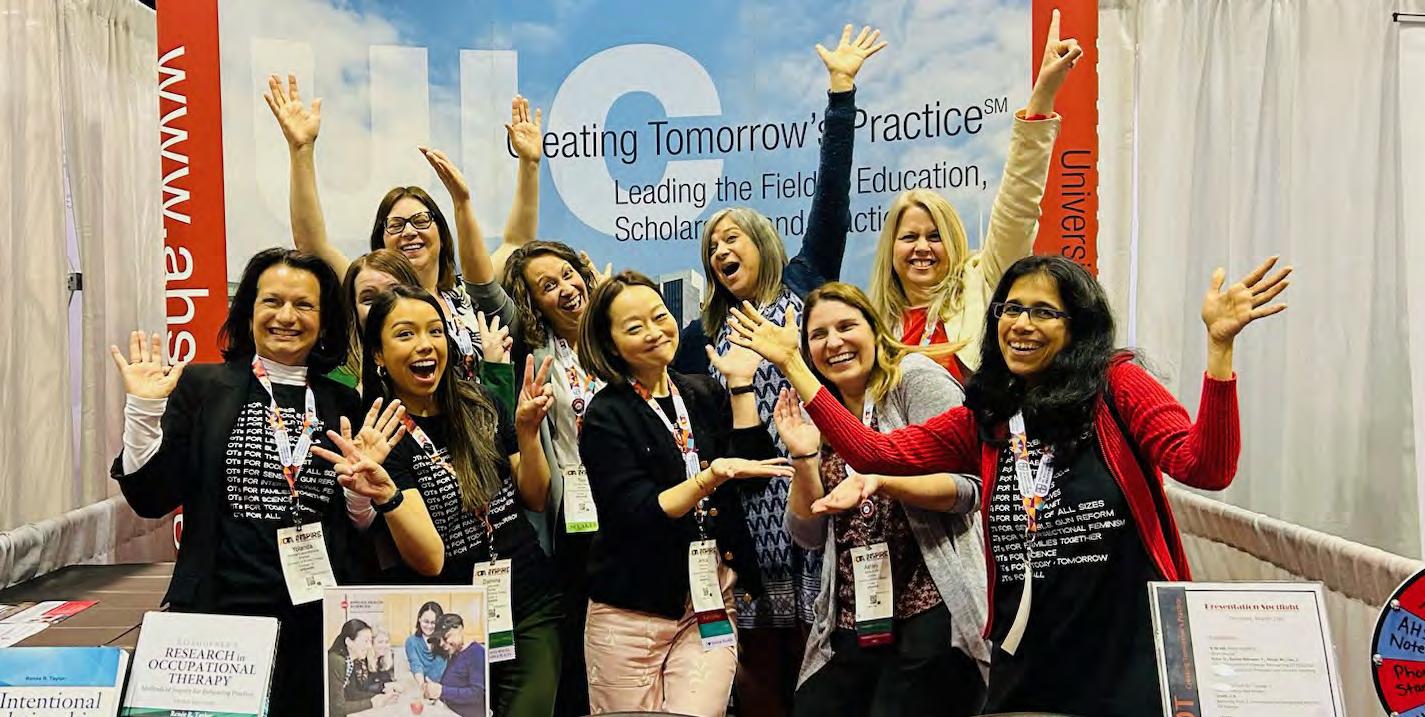
UIC OT faculty at the American Occupational Terapy Association 2024 Annual Conference & Expo in Orlando, Florida. Back (lef to right): Kathy Preissner, Cailtin Smith, Toni Van Denend, Susan Magasi and Heidi Fischer. Front (lef to right): Yolanda Suarez Balcazar, Dalmina Arias, Jenica Lee, Ashley Stofel and Mansha Mirza.
In December 2024, the entry-level doctor of occupational therapy (E-OTD) program was granted initial accreditation by the Accreditation Council for Occupational Terapy Education of the American Occupational Terapy Association. Te decision is another indicator of success for the program, which is currently ranked by U.S. News & World Report as the third-best occupational therapy graduate program in the nation.
“UIC’s outstanding E-OTD program is the result of a facultywide efort,” said Liz Peterson, E-OTD program director and clinical professor, “and the exceptional expertise of the faculty is refected in all aspects, from the admissions process to the doctoral capstone.”
In fall 2016, OT faculty voted to establish E-OTD as a replacement for the entry-level MS in occupational therapy, responding to changes in accreditation standards, increased complexity of occupational therapy practice and better adherence to the principles of a Research 1 university. Afer years of work developing the program, the inaugural cohort of E-OTD students will graduate in 2025.
Tough E-OTD is new, UIC has one of the country’s oldest programs for professional education in occupational therapy. Te original degree, established in 1943 within the College of Medicine, was a BS that led to certifcation and licensure for graduates. In 1996, the department began ofering a master's degree,
allowing students with a bachelor’s degree in another discipline to be certifed in occupational therapy. In 1999, the last class was admitted to UIC’s bachelor's of occupational therapy program.
Te E-OTD curriculum is made up of 38 required courses, for a total of 110 credits at the 600 level. Te curriculum features a series of professional development and leadership courses, evidence-based practice courses and innovative “block” courses, which typically meet 12 hours per week.
In the third year of the E-OTD program, students devote their eforts to doctoral capstone work. Te E-OTD class of 2025 began their 14-week capstone experiences in January, working in community-based, clinical and academic settings. Each project is unique, representing the intersection of a student’s interest, the needs of the capstone site and the faculty advisor’s expertise.
“It would not be possible to realize many of the curricular goals of the E-OTD program without the clinical and communitybased partnerships that have been built through years of collaboration,” Peterson said. “In addition to making exciting Level I and Level II feldwork and capstone opportunities possible, these partnerships facilitate the involvement of consumers, their advocates and health care professionals in many classroombased courses.”
Carlos Crespo, AHS dean and KN professor, was named one of Crain's Chicago Business’ 2024 Notable Latino Leaders.
Each year, the business publication recognizes Chicago individuals who manage, mentor, innovate and give back in their industries and communities. Crespo was one of six honorees from UIC.
“It’s nice to be recognized — it’s good for our college to be highlighted in this capacity — but it’s a responsibility and an honor to be a Latino leader within UIC, a Hispanic-Serving Institution.”
Crespo was honored for his academic achievements and for diversifying the biomedical workforce. He has secured more than $50 million in research funding throughout his career, putting him in the top 1% of National Institutes of Healthfunded principal investigators from 2017 to 2022. He is also a fellow of the Hispanic Association of Colleges and Universities' Leadership Academy, La Academia de Liderazgo.
“I’m fully aware of the contributions I can make just by showing up. It’s important for young students, junior faculty and others to see themselves in higher positions. You cannot be what you cannot see.”
Crespo was also recognized for establishing the Enhancing Cross-disciplinary Innovation and Training Opportunities program (EXITO): an undergraduate research training program for students from underserved or historically marginalized communities.
More than 600 students were trained through the program at Portland State University, where Crespo previously served as a public health professor and administrator until 2022. Crespo launched EXITO for AHS in summer 2024.
“We keep trying to solve the same problems with the same people, and we end up with the same results. We need new ideas, new people from new backgrounds, to look at problems — especially health — and come up with new outcomes.”
Research partners Lieke van Heumen ’15 PhD DIS and Courtney Krueger are impacting the feld of disability studies in the United States and abroad as they promote inclusive research practices.
Troughout her career in disability studies, DHD clinical associate professor van Heumen has foregrounded the voices and experiences of individuals with disabilities.

Lieke van Heumen (lef) and Courtney Krueger (right).
“I believe research becomes more meaningful and relevant when it is conducted in an inclusive way,” van Heumen said during a keynote presentation with Krueger at the International Association for the Scientifc Study of Intellectual and Developmental Disabilities World Congress in August 2024.
“It advances knowledge by utilizing the expertise that lived experience brings. It is a privilege to support highlighting that expertise.”
Van Heumen’s commitment to conducting inclusive research and creating inclusive learning environments has garnered support from Special Olympics International, through which she met and began collaborating with Krueger.
Krueger — a self-advocate, athlete leader and health messenger at Special Olympics Illinois — has worked with van Heumen for the past fve years on a range of projects. Te pair has published research on self-advocacy, created training programs for co-researchers with intellectual and developmental disabilities, developed accessible health resources and more.
For Special Olympics International, they created narrated and captioned videos for children and adults with disabilities, covering topics like obesity, high blood pressure, heart disease, mobility, oral health, eyesight and hearing.
Krueger and van Heumen’s collaborative eforts were also showcased during a trip to the Netherlands in April 2024, funded by a grant from the University of Illinois Urbana-Champaign. Te pair gave lectures at the Netherlands Institute for Human Rights, the University of Amsterdam and the University of Humanistic Studies in Utrecht on the topics of advancing inclusive disability policies and intellectual disability culture.
Although obstacles to inclusive research practices remain, such as inaccessible ethics trainings or roadblocks in recruiting study participants, Krueger and van Heumen persist in their shared mission: bringing people with disabilities to the table as leaders in disability research.
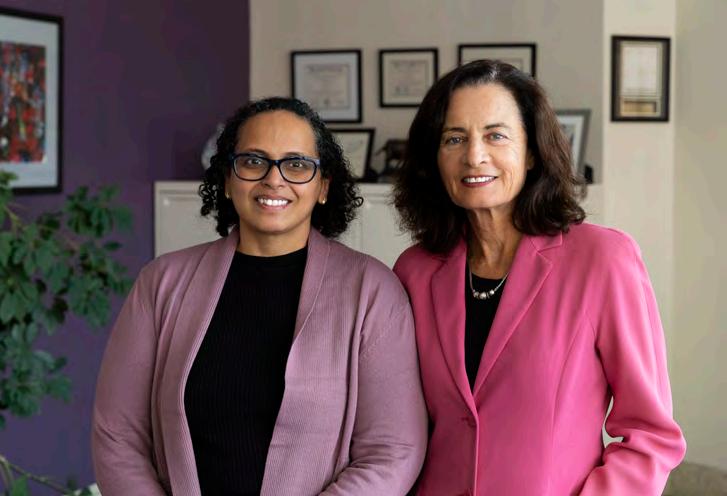
Te Institute on Disability and Human Development, in partnership with Brandeis University, has been awarded a fve-year, $4.3 million Rehabilitation Research and Training Center on Family Support grant from the Administration for Community Living’s National Institute on Disability, Independent Living, and Rehabilitation Research, part of the U.S. Department of Health and Human Services.
Sumithra Murthy ’22 PhD DIS, visiting DHD clinical assistant professor and the project’s principal investigator, said the institute has long been known for its eforts to meld aging and disability research, practice and policy. More work is needed, however, to understand the experiences of Hispanic, Black and LGBTQ+ caregivers.
“Caregiver groups from minority, racial, ethnic or other sexual-orientation groups have not been studied sufciently to provide the evidence necessary to address their needs,” said Murthy. “It is critical to build knowledge on the lived experiences of families caring for a member with a disability, especially those who are underrepresented in research.”
Te project’s goal, Murthy said, is to “improve family support, policies and practices, as well as improve community living and participation outcomes for people with disabilities and their families.” Te project will create a national resource center on family support within the institute, providing families and caregivers with training and technical assistance, then disseminating fndings to health care professionals and policymakers. A task force will oversee the center’s activities and ensure that its research-based information is efective, usable and accessible.
Te project will focus on people with intellectual and developmental disabilities, an ofen-overlooked group. Tamar Heller — DHD distinguished professor, co-principal investigator on the project and director of the Institute on Disability and Human Development — said roughly 72% of people with developmental disabilities live with their parents or families.
“Tere are personal barriers within families, so sometimes the needs of the families might be diferent from the needs of the person with disabilities,” Heller said. “Te new center will focus not only on understanding these complex needs and relationships across diferent cultures, but also testing interventions that help families and people with disabilities in planning for the future and in promoting their health as they age.”
Additional AHS researchers on the project include DHD professors Kelly Hsieh and David Camacho, graduate student Randa Abdelrahim, research associates Jae Jin Pak and T.J. Gordon, Jr. ’19 MS DHD, PT professor Tanvi Bhatt and BHIS professor Spyros Kitsiou.
Collaborators include Self Advocates Becoming Empowered, the University of Missouri-Kansas City, the Sibling Leadership Network, the National Hispanic Council on Aging, the National Association of Councils on Developmental Disabilities and the National Alliance on Caregiving.
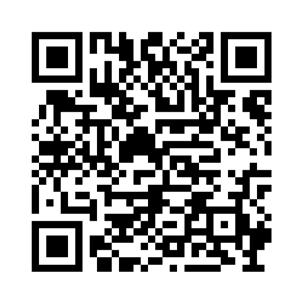
Read additional news and notes.
When you donate to an AHS department annual fund, you directly support that department’s most urgent financial needs, giving its leadership the flexibility to use the funds when and where they are most effective.
Donations to department annual funds support:
• student scholarships and travel awards
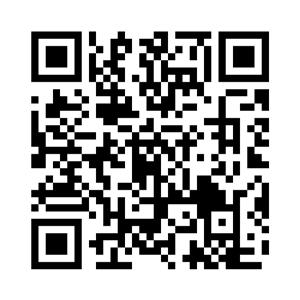
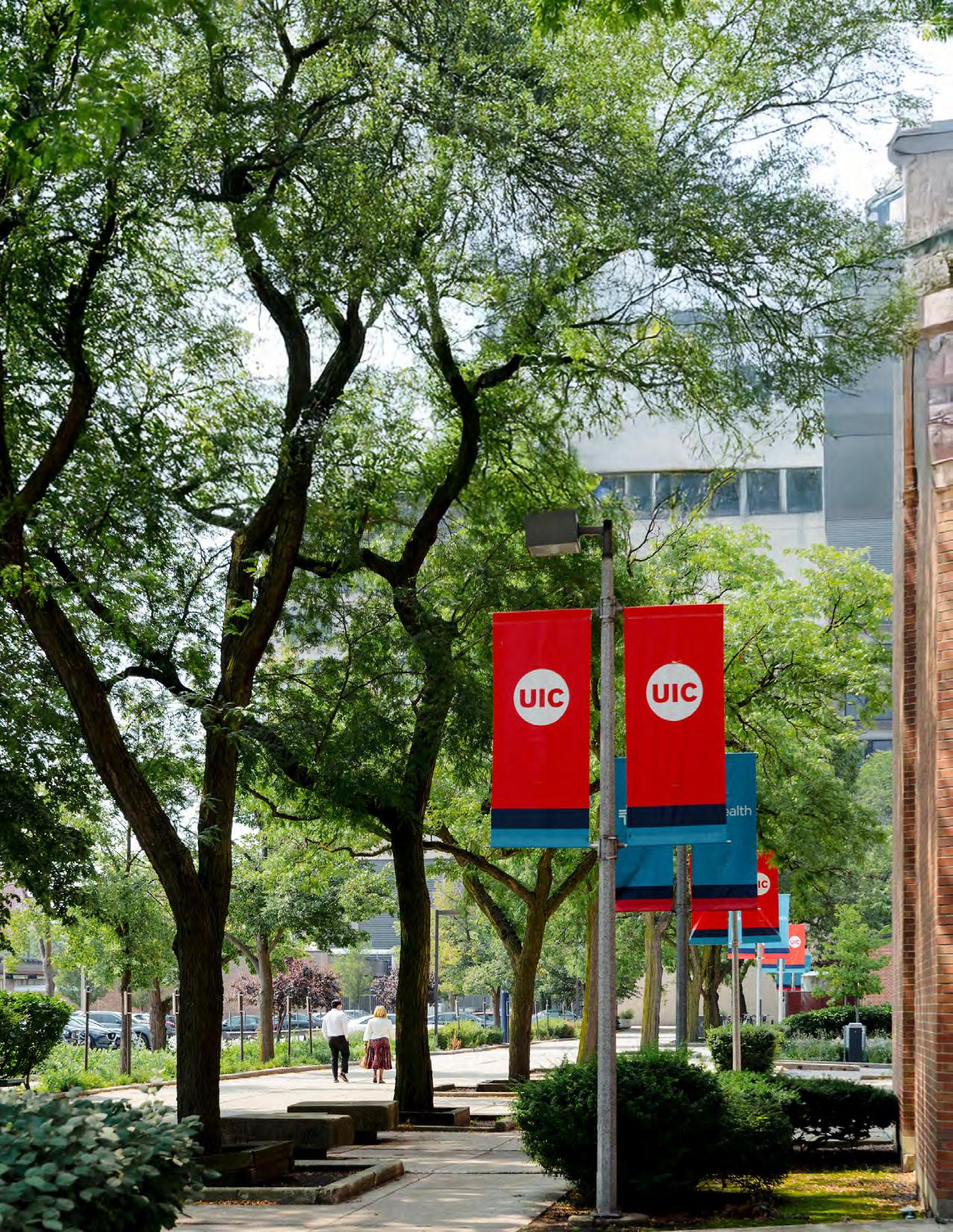
• student-, faculty- and staff-led efforts
• improvements to academic and clinical facilities
• groundbreaking research and scholarship
Donate to the AHS department of your choice at ahs.uic.edu/support or contact Torine Pasek at torine@uic.edu or 312-996-1339.


Carol Gill and Larry Voss are remembered for advancing disability rights, scholarship and pride.
Carol Gill and Larry Voss helped found a movement.
With Larry, her husband, by her side, Gill became an internationally known researcher and scholar in disability studies. Her work centered on the lived experience of people with disabilities, including identity, community attitudes and social and political context.
“She not only shaped our program, she shaped the field,” said Tamar Heller, DHD distinguished professor and director of the Institute on Disability and Human Development in AHS.
The two were much-beloved partners, parents, teachers, mentors and advocates. In their memory, a college fund to support disability studies was recently established by friends and colleagues.
“People you talk to about my parents would say that they were some of the most amazing people they have ever met,” their son, Brian Voss, said.
Gill and Voss were both disabled by polio as children. They met in the ’60s as students at Spalding School, a Chicago public school for children with disabilities.
“It was a time of awakening across America about issues of race and other dimensions of marginalization,” Gill said in a 2021 Chicago Tribune story about the school. “We had events to put to our words and experience and, in a sense, validate our existence. This helped us shift the whole meaning of 'disabilities.' It gave me something to carry on in my life’s work.”
Voss, who was a special education teacher in Chicago and held a master's degree, was a single parent when he married Gill in 1979. They moved to the San Fernando Valley, California, where Gill ’73 MA, ’79 PhD completed her postdoctoral clinical work and became director of rehabilitation psychology at a Glendale medical center.
Brian Voss recalls his dad, who had once been a driving instructor, rising at 5 a.m. to take his mom to work, a 15-mile journey, before heading to his job as a special education teacher and department chairperson in the Los Angeles public schools. He returned to pick her up every afternoon.
In the early 1980s, the disability rights movement started taking to the streets. The couple was there, along with Paul Longmore, Diane Coleman and other activists. Their son, by then a teenager, remembers his parents getting arrested at protests.
“It was just something that they did,” he said. “Later I came to realize how powerful their efforts were to promote not just disability rights and awareness, but disability pride as well.”
During that time, the issue of legalized assisted suicide came to the forefront with the case of Elizabeth Bouvia, a woman with disabilities who petitioned her hospital to desist from feeding. Gill was an expert witness in the case, speaking against euthanasia and assisted suicide and arguing that instead of helping a person with disability die, society should focus on helping them live. It was one of the topics she continued to explore throughout her career as a researcher and scholar.
The couple returned to Illinois in the early ’90s, joining UIC in 1996. Gill met two colleagues who would become lifelong collaborators and friends: Teresa Savage, then a postdoc in nursing, and Kristi L. Kirschner, just starting her medical career at the Rehabilitation Institute of Chicago (now Shirley Ryan Ability Lab).
“She made me think about my own bias as a health care provider,” said Savage, now clinical associate professor emerita of nursing.
“Carol helped other people understand the lived experience of disability through her scholarship, her contributions to the literature and her research.
Top photo: Carol was infected by polio as a young child, near the end of the epidemic. She spent months in the hospital, including time in an iron lung. Her experiences as a child and adult with disability shaped her research and advocacy.
Middle photo: Carol received her bachelor's in psychology from Saint Xavier University in Chicago, 1970.
Bottom photo: Carol and Larry's wedding at a family member's home on Aug. 19, 1979. The two shared everything, their friends said.
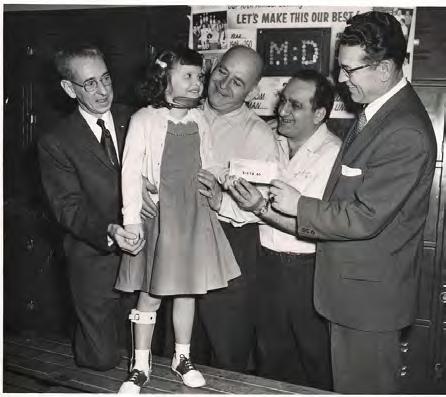


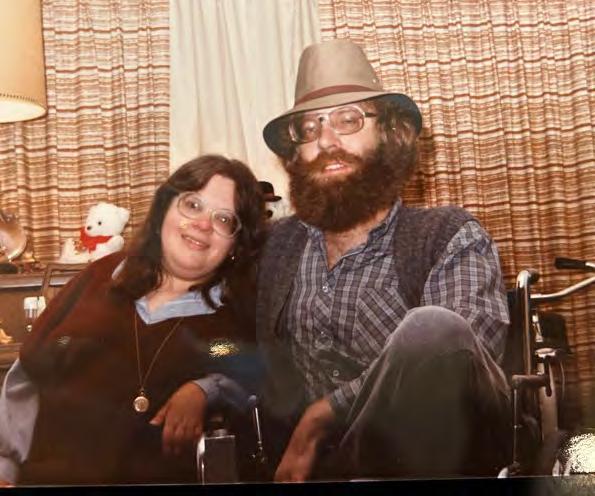
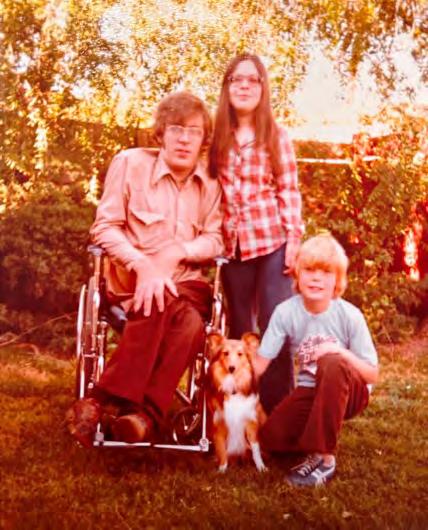
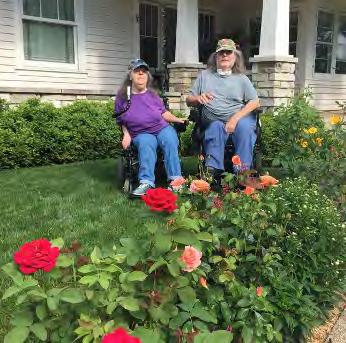
“I valued her intellect, her perspectives, her advice, her way of shining a light on disability identity,” said Kirschner, clinical professor of medical education in the College of Medicine’s Department of Medical Education.
“What does it mean to live as a person with a disability? How should health professionals come to understand the unique experience of living with disability, as well as disability as a cultural phenomenon? She taught me so much,” Kirschner said.
At UIC, Gill was director of the Center for Disability Research and head of the nation’s first PhD program in disability studies.
“Her legacy will live on with the many people she influenced,” Heller said. “Carol mentored so many students who went on to be great advocates, researchers and practitioners. She not only sparked their scholarly work, she also had a profound effect on their self-identity.”
Heather Stone ’16 PhD DHD, a behavioral therapist in Buffalo Grove with a practice focused on children with autism, was one of those students.
“Meeting Carol opened a world of possibilities, and as a young woman with a disability, I found in her a powerful role model,” Stone said. “She exemplified how a disabled woman could not only achieve her goals but also lead a fulfilling and purposeful life.”
Stone was married with two young children, “writing my dissertation while I was changing diapers.” Her kids are now 9 and 13, and “they've grown up with a blind mom, and that's just the status quo for them,” she said.
Voss was also an influence. She saw how he supported Carol, realized what
wasn’t working in her own life, and eventually ended her marriage.
“He was so down to earth, so grounded, so kind, so calm. He was this solace for her — the peer who understood her,” Stone said.
Savage likes to remember a story about the couple. As Gill’s lifelong wheelman, Voss was driving their accessible van in downtown Chicago. Gill disembarked and went “lickety split right down the middle of the street” in her wheelchair. Savage watched with alarm. Voss said calmly, “We’ll catch up with her.”
Voss was a project coordinator in the Institute on Disability and Human Development and longtime member of the Chancellor’s Committee on the Status of Persons with Disabilities. His persistent advocacy helped move the campus toward greater accessibility, said Robin Jones, director of the Great Lakes ADA Center.
Automatic doors at building entrances, accessible parking, wheelchair lifts on shuttle buses, disability priorities for campus snow removal: these are some of Larry’s legacies, said Jones, who cochaired the committee with him.
“He understood that things would not be accomplished overnight but at the same time, had little tolerance for excuses. He was a quintessential example of the generation of individuals who grew up fighting for their rights and refusing to be ignored.
”Gill and Voss were true partners in everything, friends say. They loved classic rock, Shetland sheepdogs, antiquing, cooking, gardening and spending time with friends and family, which included their caregivers. Voss was known for his extensive wardrobe of tropical shirts, later inherited by his six grandkids.
Bottom
: Carol and Larry loved to garden. They grew both flowers and vegetables in the yard of their Darien home.
By their own example, they taught their son the work ethic that helped him and his wife, Amy Rainwater, establish Gold Wave Inc., a construction services contracting and consulting firm.
Friends describe Gill and Voss as a “sweet couple,” but they were also tough. Their son remembers his dad doing wheelies down the street and the time he intimidated a big neighbor boy who came looking for a fight with Brian. As for Gill, “she had grit, and she had grace,” Savage said.
“He was her heart, and his passing on Oct. 14, 2022 was the most painful thing she had to endure,” their son said in her eulogy. “But strong as she was, she pushed through his loss and continued to enjoy life to the fullest.”
When Gill was hospitalized for the last time before her death on Aug. 31, 2024, and health care providers spoke condescendingly to her — an attitude she had fought all her life — Savage gave them some of Gill’s published articles to read.
“She's the smartest person I know, so don't talk down to her,” Savage told health staff.
Savage, Kirschner and her husband, Raymond Curry, professor of medicine and medical education and another friend of the couple, established the Dr. Carol J. Gill and Larry Voss Disability Ethics Memorial Fund to
support work in disability culture, identity and ethics in DHD.
To donate, visit yourgift.uic.edu/Gill or send a check payable to University of Illinois Foundation; in memo or cover note indicate “UIC Dr. Carol J. Gill Disability Ethics Memorial Fund” and mail to: PO Box 734500, Chicago, IL 60673-4500
“We want to preserve her legacy,” Kirschner said of the fund. “My hope is that this will continue the foundational work of disability studies for other students coming through the program.”
Donate to the Dr. Carol J. Gill and Larry Voss Disability Ethics Memorial Fund: yourgift.uic.edu/Gill

To watch the video, visit: go.uic.edu/CarolandLarry.
“
My disability affects my life in making it more complex and less spontaneous, because I have to do a lot of planning. But on the other hand, it challenges my creativity. And like a lot of people who’ve been disabled from an early age, it’s become a normal part of my life. So, in many ways, I consider my disability more of a lifestyle issue than a medical diagnosis.
”
– Carol Gill, video interview series with Larry Voss, July 2011, Disability Rights Education and Defense Fund
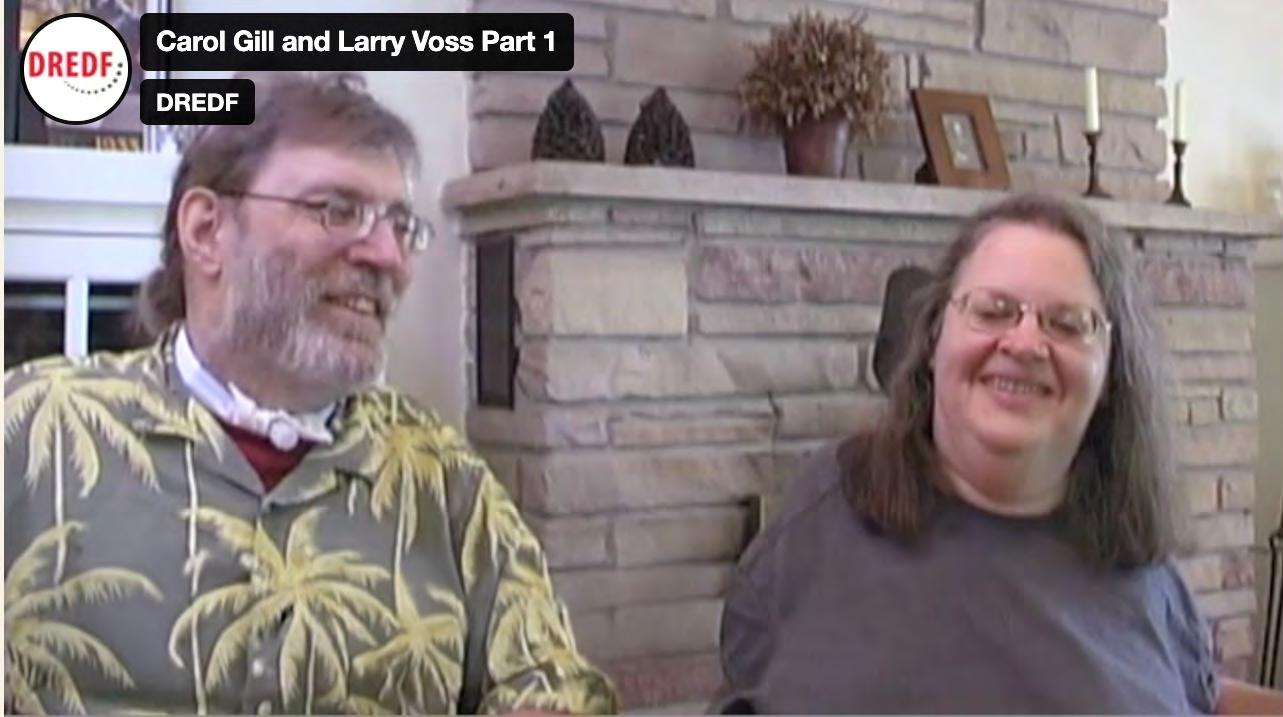
For Eduardo Bustamante ’13 PhD KN, making material improvements to child health requires a focus on the basics: nutrition, sleep and exercise. As director of the Healthy Kids Lab at UIC and KN associate professor, Bustamante has conducted plenty of research on the benefits of childhood health behaviors to advance science, but his primary objective now is to help parents take advantage of those benefits, encouraging simple changes that improve health for the whole family.
The BUILT family lifestyle program — Be Unstoppable In Life Together — was designed to promote evidence-based health routines families can keep. Bustamante has called in Chicago families, community organizations, institutional supporters and scientific thought leaders to work together on promoting healthy routines at home.
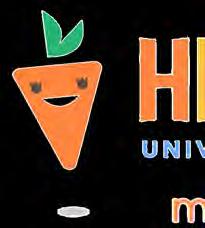
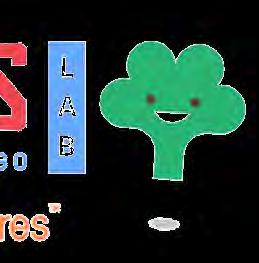
We spend a lot of time in our field searching why health behaviors are ally important for people,” Bustamansaid, “but the problem is that people st don't actually do those behaviors. tervention studies come and go, and e know that the progress made won't e sustained. So I wanted to do somehing different.”
The BUILT program, run as an extension of existing afterschool or summer camp programs, offers six weeks of instruction on creating practical morning, afternoon and evening routines. The curriculum is designed for families during the school year and reworked for kids in the summer. Informed by current research on the effects of nutrition, rest and movement on child cognition and brain development, BUILT’s approach is holistic, combining each

of these pillars to generate a whole-week routine that fits families’ goals and resources.
Mandy Vukits, KN PhD candidate and BUILT facilitator, believes this is one way the program is unique. She and seven other UIC-affiliated facilitators are working with Bustamante to implement, assess and refine
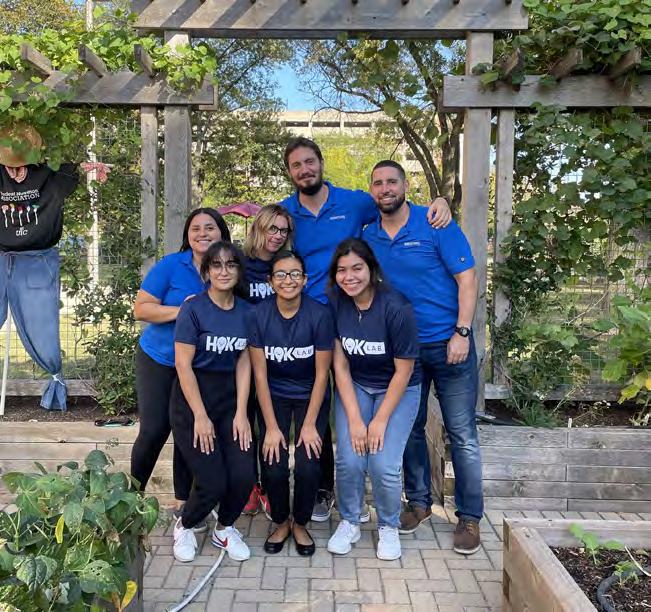
the curriculum, creating easy lessons and activities out of key findings in current health research.
“We work really hard to make the activities engaging,” said Timber Terrell, a KN PhD student on the BUILT team. “We don’t want to just give kids a worksheet; we’ll make it a scavenger hunt instead.”
After a 90-minute session with BUILT program facilitators in their school or park, families are sent home to complete challenges that put their learning into practice. Kids are encouraged to surprise a family member with a healthy snack, for example, and then post a picture of their reaction to a BUILT community message board. Other home

Photos submitted by participating families as they engaged in healthy activities.


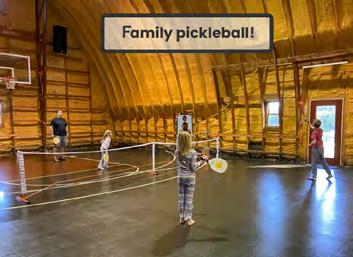
challenges ask kids to organize a family foot race or read a book with a parent before bedtime. Completed home challenges earn participants tickets, which can be redeemed for kid prizes or adult raffle entries.
Parental involvement is another way BUILT stands apart from other health initiatives. To establish healthy routines at home, Bustamante knows he needs buy-in from the whole family unit.
“It’s easy to overlay BUILT onto another organization’s kid programming,” he said. “We just have parents stay an extra 90 minutes at pickup time. And more than anything, kids value that time with parents. Involving parents contributes to staying power.”

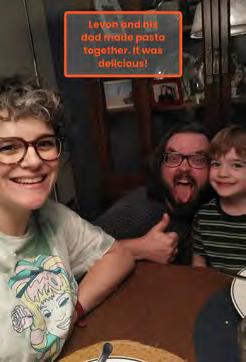
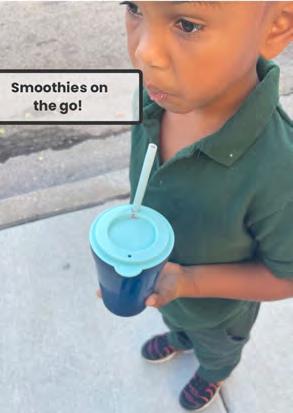


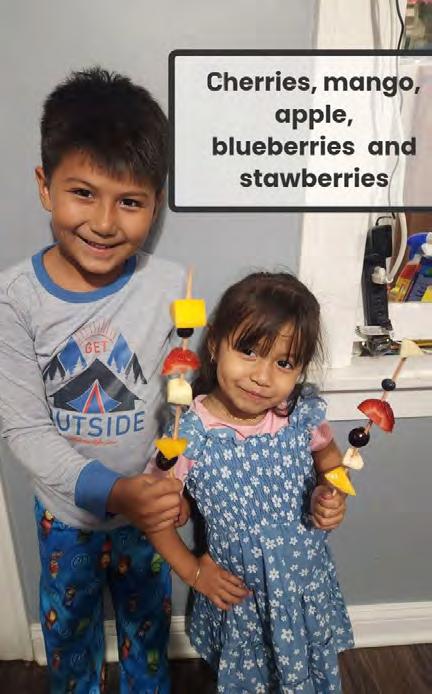

Healthy habits developed in the program are also sustained, in part, because BUILT works with organizations that already play a major role in family life — most notably, Chicago Park District. Bustamante has had a long professional relationship with the park district, beginning with research he conducted as a graduate student on a parks-related jobs program for youth. At that time, he met Colleen Lammel-Harmon, wellness manager for the park district, and the pair developed a mutual appreciation for each other’s work.
“I've published a lot on exercise and ADHD,” Bustamante said, “and Colleen had read some of my studies, so we connected on that. When you're a junior scientist, to meet somebody who's read your work and knows it — it's really cool.”
Years later, after piloting BUILT at UIC’s Comprehensive Attention Defcit Hyperactivity Disorder Clinic, the COVID-19 pandemic hit and necessitated changes to the oferings. Bustamante quickly reached out to Lammel-Harmon about implementing BUILT in parks across the city.
The collaboration is successful due to a shared goal of improving health outcomes for Chicago’s youth, but the trusting relationships between institutional leaders has also played a major part in BUILT’s expanding success.
BUILT began as a research grant from the National Institute of Minority Health and Health Disparities and has been funded for the past two years by Chicago Partnership for Health Promotion , led by Daylan Dufelmeier. With support from organizations like these, BUILT can run as an extension of existing Chicago Park District and Chicago Public Schools programming, like summer camp or afterschool care. These partnerships give BUILT access to a large segment of kids facing special obstacles to healthy living, such as poverty, disability and racial marginalization.
For leaders in these spaces, the collaboration is akin to recipe development. All parties are interested in making one dish, but they are equally interested in publishing the recipe for others to make at home.
"I think that's a really good way to look at it,” said Lammel-Harmon. “It's like, what does this recipe need from each of us in order to put it out publicly? At some point, when we specifcally are not here, how do we keep these successes going?”
Continual involvement from UIC students and faculty has also been critical for BUILT.
Since the program's inception six years ago, 39 undergraduate and 10 graduate students from AHS have helped to develop, refne and implement BUILT at parks, schools and UIC’s ADHD clinic.

Timber Terrell, Eduardo Bustamante and Yousef Abassi. Front row (left to right): Mandy Vukits, Amber Guintu, Angeline Diana De La Cruz Martinez and Yuliana Soto.
BUILT’s approachable curriculum and tie-in with trusted community organizations is an evidence-based model other health programs can follow. More importantly, the formula they’ve developed works for real families. Approximately 240 children have participated in the BUILT Kids summer program thus far, and another 80 children accompanied by 50 parents have participated in the school-year joint program, BUILT Families.
“We have measures of nutrition; we have accelerometer data for physical activity and sleep; we have mental health outcomes and we have home environment outcomes,” Bustamante said. "We're measuring whether they're actually changing dietary intake, whether it's changing kids’ behavior, what's the amount of confict in the house, all of that stuf. We have a lot of data that we report, publish and use to continually improve the program.”
Bustamante hopes to one day facilitate a randomized clinical trial comparing outcomes of kids in BUILT-afliated parks with those of kids in other parks. In the meantime, the most powerful supplement to quantifable health improvements is the feedback of the participants.
“Pretty universally, when AHS students show up in their BUILT shirts, you can see the kids go nuts,” Bustamante said. “They're all fghting to get in the room and they're excited to see the students. Those relationships can be really sweet.”
“These small chunks of time spent working on BUILT add up to shape their lives,” said KN undergraduate James David.
In the end, managing the many moving parts of BUILT boils down to a simple resolve of Bustamante’s.
“Our dream is that families all around the city are able to adopt and sustain routines around sleep, nutrition, activity and screen time,” he said. “Kids should be fed well, rest well and get to move around every day. That’s something I feel is attainable.”
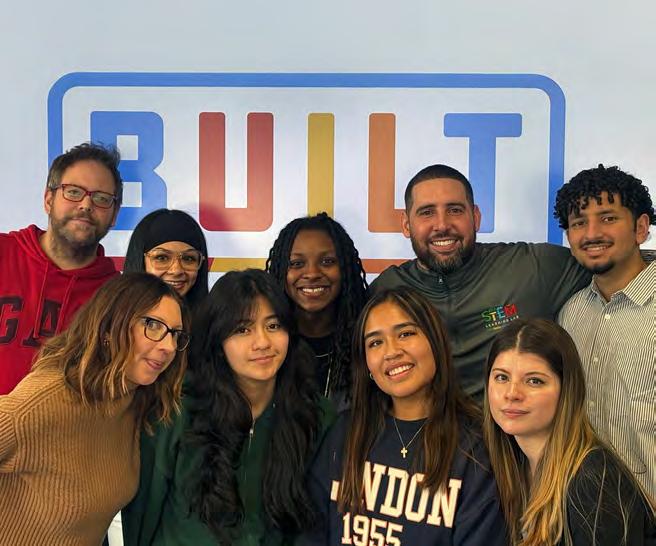
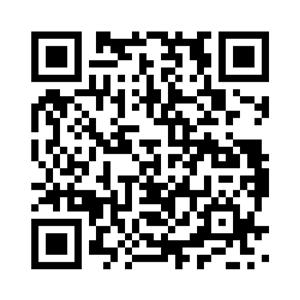

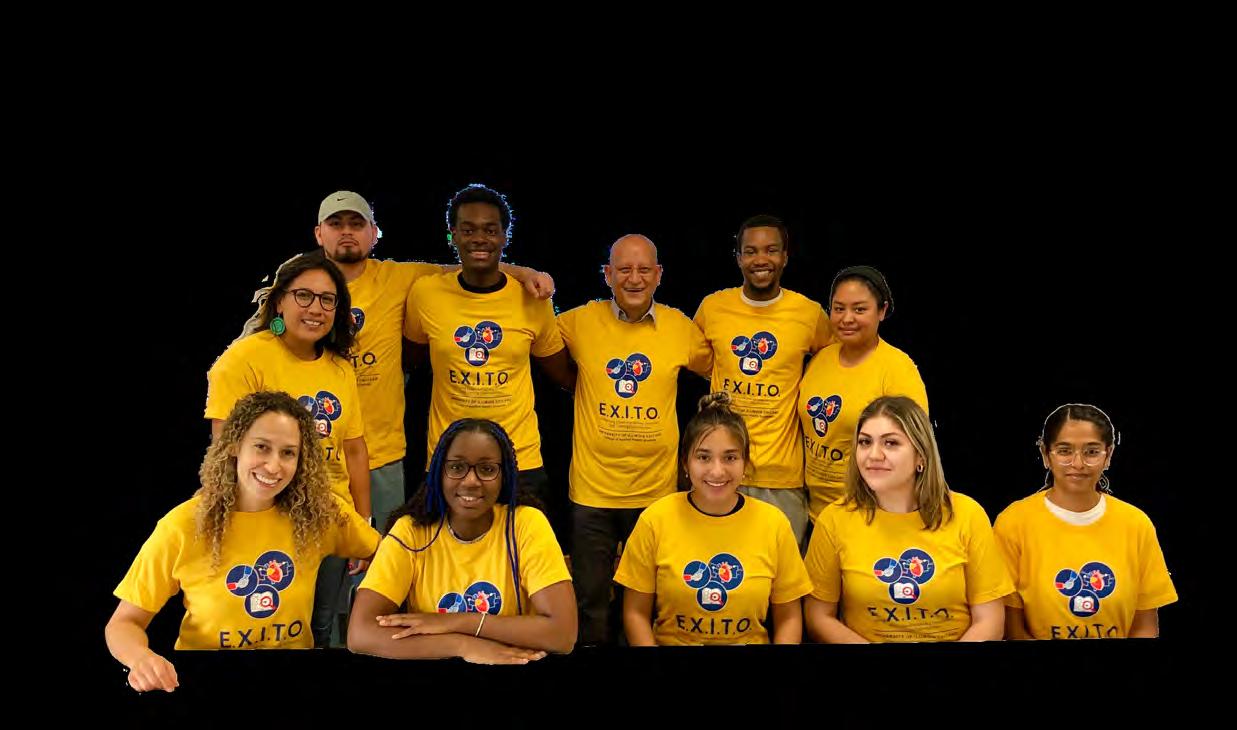
Students from all seven of UIC’s health sciences colleges are encouraged to pursue advanced studies, but when Carlos Crespo was appointed dean of AHS in August 2022, he planted seeds for a new research training program catered specifically to AHS undergraduates — especially those from underserved or historically marginalized communities. Launched in the summer of 2024, the Enhancing Cross- disciplinary Innovation and Training Opportunities (EXITO) program offers early- career students three years of specialized study, mentorship and hands- on research experience.
EXITO, which means “success” in Spanish, is intended to create leaders who can transform health and social systems in the communities that need it most. Nine AHS students from a range of departments — DHD, KN and RS — have been selected as the first cohort of fellows.
“We need to recruit students from the places where health disparities are, give them the same opportunity as students from other places and then encourage them to address their community’s problems better than anyone else can,” Crespo said.
The three -year track includes peer and faculty mentoring, enrichment workshops on research practices, placement in a research learning community (RLC), attendance at scientific conferences and opportunities to present original research. Along the way, students receive financial assistance so they can devote significant work hours to faculty research projects. Second- and third-year fellows are eligible to receive up to $5,000 in tuition support per academic year.
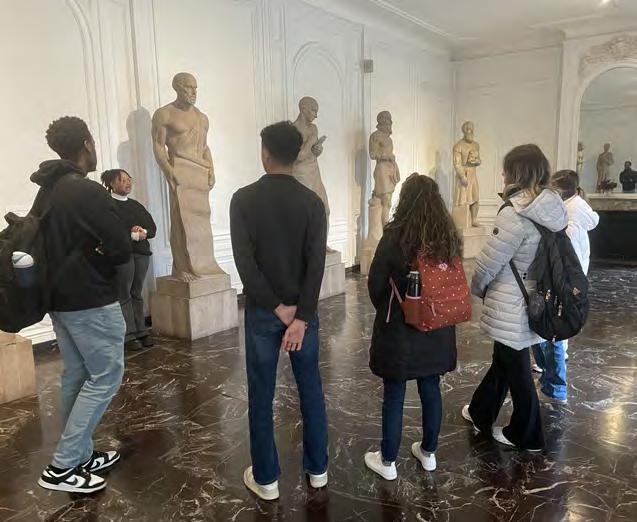
The first iteration of EXITO was born at Portland State University, where Crespo was a public health professor and administrator, serving as vice provost from 2017 to 2022. More than 600 students were trained through the program in Portland, many of whom have gone on to attend prestigious graduate schools.
Although several initiatives at UIC help students from marginalized communities succeed in health care fields, including the Urban Health Program (UHP) and Medicina Scholars, EXITO works with AHS students through multitiered mentorship — peer mentors, EXITO sponsors, research mentors and a UHP advisor — to offer support beyond graduate school or medical school admissions assistance.
Viviana Kabbabe -Thompson, AHS assistant dean of student affairs and lead in executing EXITO, looks to partner with these existing programs on campus, especially UHP’s assistant director Jennifer Hernández, to develop EXITO’s unique mission in the coming years. The goal is to increase students’ “skills and marketability through research,” Kabbabe -Thompson said. “The more we can aid in supporting one another in programming, the more successful we will be in achieving our overall mission.”
Rather than simply facilitating short stints as summer research assistants, EXITO helps fellows navigate the culture of the academic and professional world.
“These students have faced obstacle after obstacle,” Crespo said, “whether that is a hurricane or a lack of money or books that were not in their languages. They have managed to show up here at UIC on their own, and it’s up to us to get them to the next level.”
The mentorship and seminar structures of EXITO were designed to help fellows build implicit skills steadily over the course of years: how to network, speak with researchers, work in a lab, submit an abstract for a conference or present for larger audiences. Most importantly, the extended length of engagement with fellows allows them to build an identity as a scholar.
“One summer in a laboratory doesn’t eradicate imposter syndrome,” Crespo said. “It takes a couple of years for students to think of themselves as fellows or scientists.”
The EXITO program officially began in summer 2024 with a three -day research academy, where fellows met working researchers and built some excitement for the road ahead. For Ciara Balkcon, a KINES undergraduate student and EXITO fellow, the summer kick-off event set the tone for her journey and presented her with role models to follow.
“I got the opportunity to meet with staff in the college and hear their stories of hardship, mistakes and eventually finding the path that got them to where they are now,” she said.
Crespo also values those stories of academic struggle and dealing with roadblocks as a researcher.
“The fellows may end up working with faculty members who submit grant proposals to NIH that get rejected. This will teach perseverance; that’s important.”
As the fall semester began in 2024, fellows started weekly enrichment workshops taught by PT clinical associate professor Grenita Hall. The curriculum covers communication skills in academic settings, basic research concepts and CliftonStrength assessments to identify their top qualities.
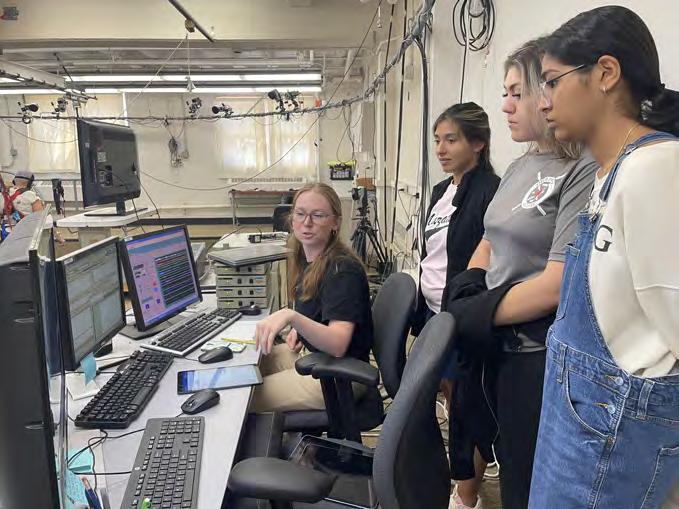
“Fellows have worked intensely in weekly enrichment sessions in addition to their academic obligations,” Hall said. “This is the first cohort, and they are doing an exceptional job!”
“The enrichment workshops have been primarily focused on how to search for and present yourself for opportunity, as well as learning about what it means to be a researcher,” said Balkcon. “Research is a vast landscape, and it's important to find the right fit for you.”
The formation of RLCs will be a turning point for fellows looking for their own perfect fit. During UIC Research Week in April, an annual series of events to celebrate the university’s successes in research, fellows will interview to join an RLC: a designation given to faculty research projects with established investigators and two years’ worth of external funding. EXITO leadership is in the process of identifying AHS research labs or centers that qualify as RLCs and can build long-term mentor relationships with fellows. The “heavy lifting” starts in early June, according to Hall, when fellows will begin contributing in their RLCs 18 hours per week for eight weeks. That working relationship will run from this summer through two academic years, up to the fellows’ graduation.
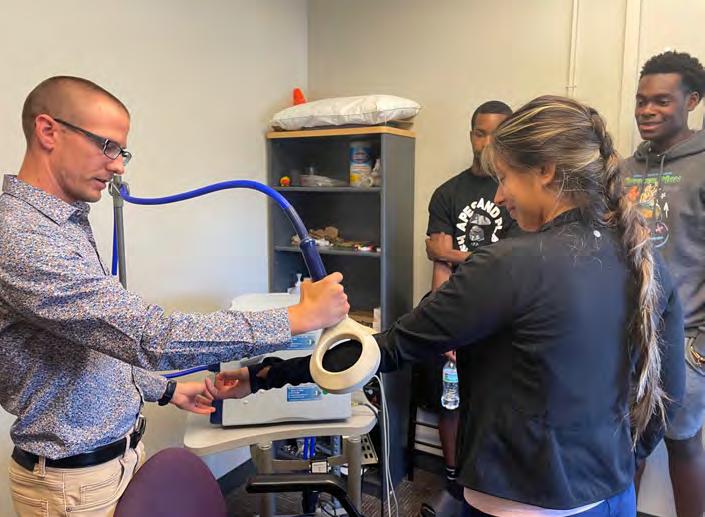
Developing faculty — as principal investigators and as heads of RLCs — is just as important as training the undergraduates of EXITO. PT professor Sangeetha Madhavan will work on faculty recruitment, engaging those interested in developing the mentor-mentee relationships that are baked into the EXITO track. For the 2024-2025 academic year, RLCs will be led by faculty with active, funded research projects. In the future, EXITO will award pilot grants to help promising projects become RLC- eligible, increasing opportunities for both researchers and incoming fellows.
“As a dean, I want AHS faculty to advance and conduct research, but as the PI of EXITO, I want them to include our fellows in those projects,” Crespo said. “It’s important for any faculty member submitting a grant to think about how their research affects their students and the community.”
Though fellows won’t receive their RLC placements until spring 2025, many of them are already drawn to certain topics. Balkcon, for one, hopes to conduct research that resonates with her personal life.
“As someone who is disabled and a lower-limb amputee, I've taken an interest in the never- ending growth potential in the field of prosthesis and orthotics,” Balkcon said.
"My hope is to tap into the untapped areas for improvement as I've experienced them. I want to build a name for myself in research and contribute meaningfully to the areas that I see affecting the community I'm a part of.”
The three -year journey has only just begun, but already the fellows and faculty alike recognize how important community

will become for EXITO. Hall highlighted how supportive of one another the fellows already are; social events organized to build bonds have so far been well attended.
“I met some great peers who are finding out what and where they want to be, too,” Balkcon said.
Since day one, the fellows in this first cohort possessed common traits that will be crucial for embarking on careers in advanced academic research.
“These are innovators,” Crespo said. “They have had to improvise their entire life. That you cannot train.”
Editor’s note: in this issue of UIC Applied Health Sciences Magazine, we feature a recent inspiring graduate.
When Gerardo Hernandez ’24 BS NUT enrolled at UIC, he already was familiar with the university’s reputation for promoting health equity and student research.
Tat’s because Hernandez had been coming to UIC for years, starting when he was a high school student at J. Sterling Morton West High School in Berwyn, where he grew up. Even as a teen, he knew he wanted to focus on a career in health and make a diference in his community. He didn’t have to wait until college to get started on his path.
Hernandez has been accepted into the college’s Accelerated Master’s Coordinated Program to continue his education and become a registered dietitian.
In his frst year of high school, Hernandez learned about the Medicina Academy Apprentice Program at UIC and applied. Te program, housed in the UIC College of Medicine, prepares Latino students for careers in medicine and health care.
Every other Saturday for three years, Hernandez and other Latino high school students in the program came to UIC for lectures from pediatricians and family doctors, discussions about health equity led by medical students, lessons on anatomy and physiology and lab experience.
found helpful guidance from the university’s Latin American Recruitment and Educational Services, or LARES. Advisors helped him navigate fnancial aid, shif majors, get tutoring in chemistry and stay on track with requirements for his degree.
In college, Hernandez kept up the weekly volunteering he started as a high school student by handing out healthy food at the Ebenezer Christian Reformed Church in Berwyn. Now he knows more about growing and cooking these foods, too. For his college nutrition classes, he had to devise healthy recipes, sometimes using food grown and harvested from the UIC Teaching Nutrition Garden behind AHSB.

Hernandez knew that nutrition is a big factor in chronic diseases like diabetes, hypertension and kidney disease, which disproportionately afect Latino people. He wanted to develop the skills to make a diference in his community.
“People should have equal access to eating a healthy and balanced diet and living a life that is free from chronic diseases,” he said. “Unfortunately, communities of color are afected the most by these conditions. As a member of the community, I should help my own people and get them where they should be.”
Afer graduating from high school, Hernandez entered UIC in 2021 and later changed his major from biology to nutrition. He
“For some of our classes, like Food As Medicine, we are able to collect ingredients there,” he said.
Te students learned farming techniques, too, on a small scale. Hernandez has planted and grown some of the garden’s produce during springs and summers.
Te accelerated master’s degree program encompasses clinical rotations, community work and classroom study. Hernandez would like to work at both UI Health and at an Oak Park food pantry for those requirements. Already, he’s thinking about expanding his focus to others he can help — especially people with eating disorders, which are ofen misunderstood, he said.
“Usually the case happens because a person wanted to improve their own health. Maybe they didn’t have the proper tools,” he said. “But as dietitians, we are equipped to help them set themselves free from that condition.”
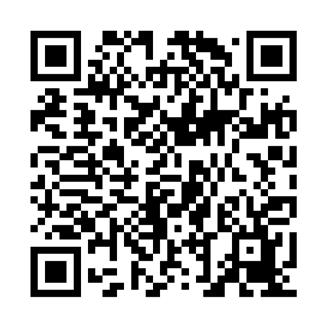
Watch a video encapsulating his college experience: go.uic.edu/InspiringGradsFall2024 .
Stay connected!
Exciting life change? New milestone? Ready to get involved? Submit a class note to the UIC Alumni Association: go.uic.edu/UICAAClassNotes.


Th stu acr
By tale e AHS Scholarship Fund supports undergraduate dents with financial need from academic programs oss the college. donating, you cast your vote of confidence in the nt and promise of our students while easing their financial burden and inspiring them to be bold and go far.
Donate at ahs.uic.edu/support or contact Torine Pasek at torine@uic.edu or 312-996 -1339.


College of Applied Health Sciences
University of Illinois Chicago
808 S. Wood St., 169 CMET
Chicago, Illinois 60612-7305
Address Service Requested

